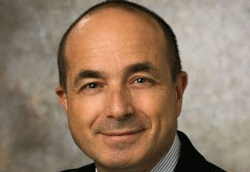 |
| Jeremy Levin |
Jeremy Levin has stepped up with a $75 million round to back Phase II work on Ovid Therapeutics' lead drug for rare brain diseases as the ex-Teva ($TEVA) chief executes on his plan to build a pipeline of experimental drugs in neurology.
New York-based Ovid Therapeutics has plans to start new studies for OV101--inlicensed last April from Lundbeck--as a treatment for Angelman syndrome as well as Fragile X syndrome. Once dubbed gaboxadol, which failed as a sleep drug when Lundbeck and Merck ($MRK) had it in the clinic, the company now describes OV101 as the only small molecule highly selective extrasynaptic GABA (SEGA) receptor agonist tested in clinical trials.
Over the last few years, as gaboxadol was sitting on the shelf, new scientific work indicated that an oral SEGA drug like this regulates what is called "tonic inhibition," a mechanism the brain uses to distinguish signals from noise. And that makes it a target for autism spectrum disorders, a frustrating field that has proven deadly in the recent past to biotechs like Seaside.
In addition to 101, which has potential in the broader field of cognition and memory as a sleep regulator that doesn't leave people sedated, there are plans to develop OV201 for Lewy body dementia with two more undisclosed programs coming up behind that, according to CFO Yaron Werber. And Ovid plans to continue to build a team of about 30 staffers, looking for a CMO as it gears up clinical stage development work.
Levin--who emerged as a top industry dealmaker at Bristol-Myers Squibb ($BMY) before taking the top job at Teva, says you can expect an active dealmaking schedule as the company assembles an ambitous set of programs.
"The goal is to lay the groundwork for what we hope is a very substantial neurology company," says Levin. Ovid is focused on orphan disorders of the brain right now, targeting small patient populations.
"I think business development is going to be a very active part of what we do," he adds, with plans to build a "total pipeline in a very specific area," a discipline he refined at Novartis and executed at Bristol-Myers.
Like a number of Big Pharma alumni, Levin--ousted from a troubled Teva back in 2013--is jumping into a thriving biotech sector as venture cash gushes into the field in record quantities and IPOs continue to produce some jaw-dropping sums.
"The nature of the capital coming into the marketplace is different from previous years," says Levin. In the past, VCs invested in a very specific fashion. But as the capital base of the industry increased, different funds are now able to participate in backing startups like Ovid. That explains the large number of crossovers in Ovid's syndicate, which leaves the biotech poised to consider the right time for filing an IPO.
Fidelity Management and Research Company, a busy biotech investor, led the crossover-heavy investment syndicate, which included Cowen Private Investments, Sanofi-Genzyme BioVentures, Tekla Capital Management, Sphera Global Healthcare Fund, Jennison Associates (on behalf of certain clients), Redmile Group, and Cormorant Asset Management, as well as some undisclosed "blue chip mutual funds and leading life sciences investors." Existing Ovid investors, including DoubleLine Equity Healthcare Fund, also participated.